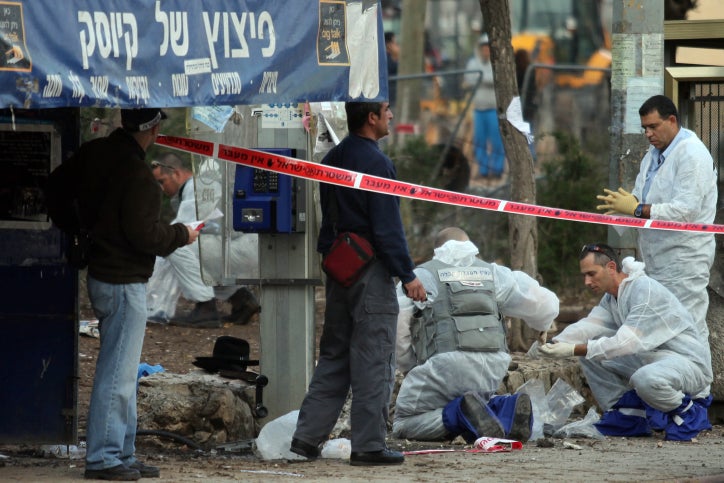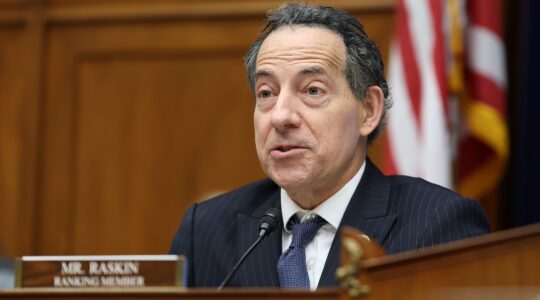WASHINGTON (JTA) – It happens almost like clockwork: Something happens in the Middle East, and it reverberates across the Atlantic with new letters from the U.S. Congress.
With so many relatively new members looking to establish their pro-Israel credentials, the reaction in Congress to the recent violence in Israel was particularly swift.
“American pressure needs to be exerted on the Palestinians, not the Israelis, to make steps toward achieving peace,” said a March 18 letter to U.S. Secretary of State Hillary Rodham Clinton from the Republican Study Committee, the conservative caucus of Republicans from the House of Representatives.
A close reading of the letters reveals the differences over what the authors believe constitutes being pro-Israel. Some place the burden exclusively on Palestinians to restart peace talks, and others call on the United States and Israel also to take steps to tamp down tensions.
After the March 11 slaughter of a couple and three of their children in the West Bank settlement of Itamar, bipartisan letters to the Obama administration from each congressional chamber urged pressure on the Palestinians to return to peace talks. Each letter outlined what it said were examples of incitement sanctioned directly or indirectly by the Palestinian Authority. It is not yet clear who carried out the killings, though Palestinian terrorists are believed the culprits.
The U.S. House of Representatives’ letter to President Obama, circulated by Reps. Steve Rothman (D-N.J.) and Steve Austria (R-Ohio), calls on the president to “insist” that Palestinian Authority President Mahmoud Abbas “re-enters peace talks, without preconditions, and demand that President Abbas eliminate all vestiges of incitement coming from his government, Palestinian entities, or officials.”
Abbas withdrew last September from renewed direct peace talks with Israel after Israeli Prime Minister Benjamin Netanyahu refused to extend a partial settlement moratorium in the West Bank.
The letter to Clinton circulating in the Senate, initiated by Sens. Kirsten Gillibrand (D-N.Y.) and Mark Kirk (R-Ill.), made similar calls.
“The Itamar massacre was a sobering reminder that words matter, and that Palestinian incitement against Jews and Israel can lead to violence and terror,” the letter said. “We urge you to redouble your efforts to impress upon the Palestinian leadership that continuing to condone incitement is not tolerable.”
The self-described “pro-Israel, pro-peace” lobbying group J Street blasted the Rothman-Austria letter, saying such statements should tackle all sides responsible for the peace impasse. The organization already had made clear the kind of letter it preferred. A March 15 letter to Obama signed by 116 House members backed the president’s proposal for keeping funding for Israel and the Palestinians at current levels — $3 billion for Israel and about $500 million for the Palestinians.
“We are thrilled to see so many members of Congress stand for the continued assistance to Israel and the P.A. that advances America’s interests and the prospects for peace and security in Israel,” it said in that statement.
All but one of the signatories on that letter, initiated by Reps. Jan Schakowsky (D-Ill.) and Anna Eshoo (D-Calif.), were Democrats, underscoring a fact of Washington’s political landscape that is frustrating efforts by dovish pro-Israel groups to win bipartisan support: Republicans are loath to sign on to anything that signals support for the Palestinians. Indeed, the Schakowsky-Eshoo letter was prompted by Republican threats to slash funding for the Palestinians.
Democrats, even those who signed the Schakowsky-Eshoo, are likely also to sign onto efforts singling out the Palestinians and other Arab nations as bearing the burden of peacemaking. That’s partly a reflection of the strength of the American Israel Public Affairs Committee, which pushes for such statements.
Emphasizing Palestinian responsibility for the impasse is likely to remain the standard for pro-Israel members on Capitol Hill given the resumption this week of rocket attacks from the Hamas-controlled Gaza Strip on Israel’s South and Wednesday’s bombing at a Jerusalem bus station.
Within hours of the bombing, AIPAC circulated a fundraising letter telling potential donors that “with a special contribution of $50, $100, $250,” they could help the lobby shepherd more than $3 billion in promised defense assistance through Congress. The letter cited the Jerusalem bombing and other attacks, and said that “Anything less than a full commitment to Israel’s security would send the wrong message at this critical time.”
AIPAC later apologized for issuing a fundraising appeal citing the terrorist attack just hours after the bombing.
Soon after, Congress members close to AIPAC were issuing statements backing full funding for Israel, despite across-the-board cuts.
“Israel remains under siege by extremist elements,” said a statement from the office of Rep. Ileana Ros-Lehtinen (R-Fla.), the chairwoman of the House Foreign Affairs Committee. “Violence against Israel perpetrated by extremist groups is relentless and illustrates the need for the U.S. to continue to provide robust security assistance to our key ally.”
Rep. Eric Cantor (R-Va.), the House majority leader, directly linked the attacks to Palestinian incitement.
“We must use the recent attacks to address the root cause of this violence: anti-Israel incitement in Palestinian mosques, schools and media — and the blanket refusal on the part of the Palestinians to accept Israel’s right to exist that it has created,” he said.

Help ensure Jewish news remains accessible to all. Your donation to the Jewish Telegraphic Agency powers the trusted journalism that has connected Jewish communities worldwide for more than 100 years. With your help, JTA can continue to deliver vital news and insights. Donate today.






